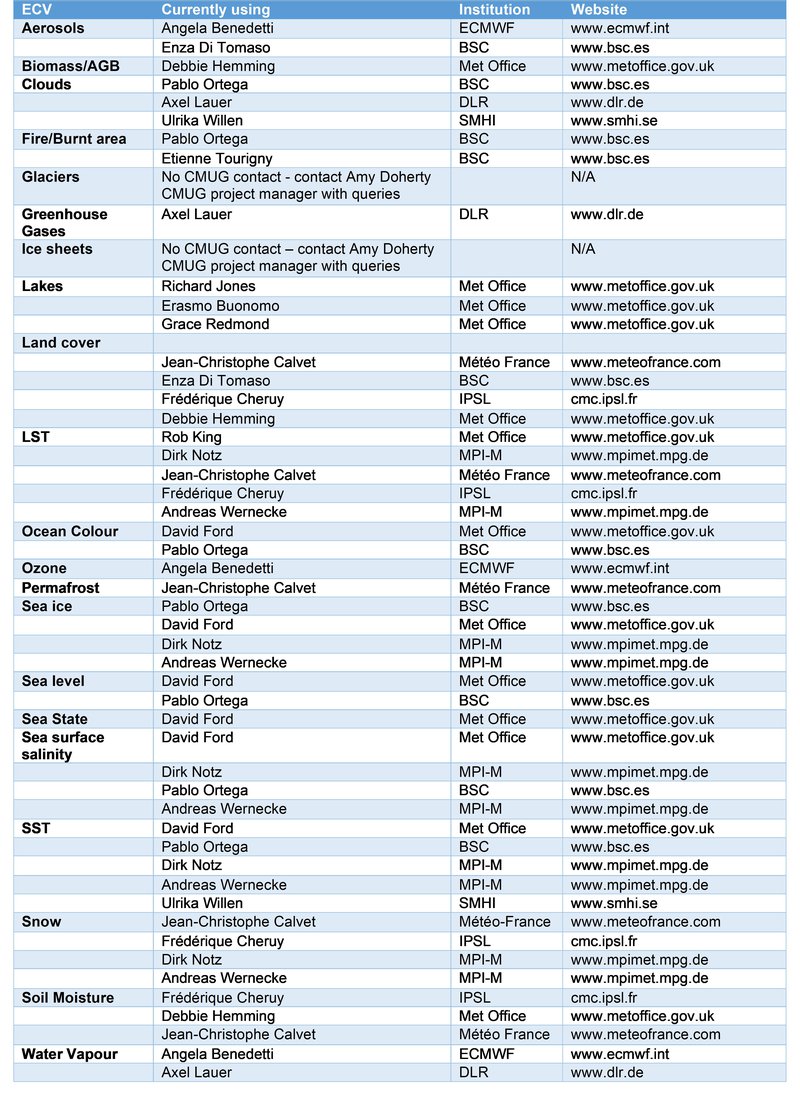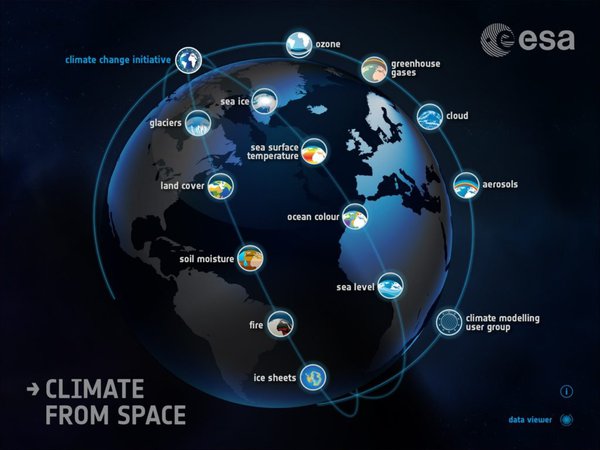Contacts & FAQ
Key contacts for the CMUG project
Contact Info
Contact the CMUG project office by email if you require further information.
Further contact information for the CMUG partners working with each ECV is presented in the table below.

Partners
NCEO (University of Leicester)
NCEO (University of Edinburgh)
FAQ
Can I feed back my experience using CCI data?
Yes please! We welcome contributors from modellers, scientists, and anybody else.
To send us your ideas or suggestions, to feed back your experience or for other enquiries, please use the contact information at the top of this page.
Do I have to pay for the data?
The data are freely available to scientists and newer versions are becoming available as they are improved over time.
A key benefit is the addition of uncertainty information with the data which is not available elsewhere.
Where can I get the data?
The CCI datasets are available from a dedicated Open Data Portal and related websites, such as Obs4MIPs.
What is CMUG's added value?
CMUG provides scientifically evaluated datasets and uncertainty estimates so that they can be used with confidence by the climate modelling and reanalysis community and other user groups.
The datasets have been assessed by CMUG partners for the validation of essential climate variables (ECVs) in climate models. the evaluation provides quality information to data users, uniquely produced by CMUG, which adds confidence in their application.
How can scientists access and make the best use of the data?
CMUG is providing an independent assessment of the CCI datasets and providing quality flags where issues are identified.
This provides quantitative information on data quality, and improves confidence in their use. The data are promoted to the modelling community to encourage their use and reduce the lead time, sometimes 10-15 years, between being produced and being used for analysis.
The CCI datasets will feed into climate data services, e.g. Copernicus Climate Change Service, set up in Europe as a source for all European climate data.
The CMUG project is providing advice to ESA on how the CCI data will be taken up and used by the climate data services.
What are the benefits of using CCI datasets?

Satellite data aren't always optimally processed and may contain jumps (discontinuities), erroneous data or have other issues. CMUG is re-processing the data to provide datasets useful for climate studies.
CMUG is evaluating a set of essential climate variables (ECVs; defined by GCOS) which were identified by climate scientists as key for climate research.
Examples of their use include ozone climate data record, profiles and total column, which are being used in reanalysis models by ECMWF and other numerical weather prediction modelling centres. This is the most accurate record we have of global ozone.
Another example is the glacier dataset. The glacier team is using CCI data to map changes in the area, thickness and extent of glaciers over time, providing a clear record of changes over the last 15 years compared with the pre-satellite record.
Sea level data provides a very clear indication of sea level rise over the last two decades associated with climate change.
For a full list of ECV projects, visit ESA's page here.
What do CCI datasets provide that is new or different?
CMUG is looking at climate consistency between the essential climate variable datasets, using modelling, reanalyses and quality assessment studies.
Highlights of the CCI datasets are that large-scale climate phenomena (such as El Niño) are consistent between datasets thanks to common data retrievals, but also that the independent processing of each dataset yields an uncertainty characterisation that is uniquely defined for each dataset.
At what stage is CMUG in the programme?
CCI Phase 1
Period: 2010 - 2014
Focus: first dataset from the CCI project
CCI Phase 2
Period: 2014 - 2017
Focus: to include additional datasets and to update the results from phase 1.
One aspect of this project phase was on assessing the consistencies between essential climate variables (ECVs) which is a unique feature of the CCI datasets.
CCI+ Phase 1
Period: 2018 - 2022
Focus: to continue to include additional datasets, to update the results from phase 2, and to conduct further multi-ECV experiments.
Continuation of the assessment of 'climate quality' of ECV consistency between CCI datasets, and the inclusion of uncertainties.
CCI+ Phase 2
Period: 2023 - 2026
Focus: improved tools for facilitating the use of CCI datasets by climate modellers, in-depth assessment of the quality and utility of CCI datasets, new scientific findings on earth system processes, improved communications between climate modelling and observation communities, and a set of deliverables which will be of great use to the CCI ECV projects.
What's next for CMUG?
CMUG CCI+ Phase 2 started in 2023 and will continue until 2026.

